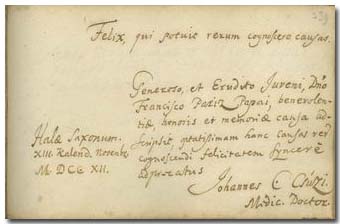
Felix, qui potuit rerum cognoscere causas. *
Generoso, et Erudito Juveni, D[omi]no Francisco Pariz Papai,
benevolentiae, honoris et memoriae causa adscripsit, optatissimam
hanc causas rerum cognoscendi felicitatem syncerè adprecatus
Johannes C. Csúzi
Medic. Doctor.
Halae Saxonum. XIII. Kalend. novembr. M.DCC.XII.
|
* Virgil,
Georgica 2.490. In the English translation by J. B.
Greenenough: “Happy, who had the skill to undersand / Nature's
hid causes.” Also quoted by Wyer Gulielmus Muys on
p. 127.
|
|
|
Happy is who could get to know the reasons of things. *
I wrote this to the noble and erudite young
Ferenc Pápai Páriz as a token of my benevolence and respect, for
recommending myself into his memory, sincerely wishing him the so
much desired felicity of knowing all these things
János Csúzi C. doctor of medicine
In Halle of Saxony, on the 13th day before the
calends of November of 1712
|
p. 339. Halle, October 20, 1712
Csúzi Cseh, János
(c. 1677-1732), Reformed pastor,
physician
János
Csúzi Cseh was born in Losonc around 1677, the son of the
Reformed bishop Jakab Cs. Cs. (1639-1695). The troubled times
forced the father to move from town to town, so János learned both
in Losonc, Debrecen and Pápa. Then he went abroad: in 1699 he
immatriculated at the university of Franeker, where he graduated
in medicine in 1702. He became a pastor in Ács and Győr, but he
also pursued medicine and even alchemy. Later he went on a three
years European tour displaying a pair of Siamese twins from Szőny,
by which he earned a lot. (The twins were described in foreign
publications, like for example: Disputatio medica de monstro Hungarico,
quam … sub praesidio Michaelis Ernesti Ettmulleri … publice
ventilandam exhibet Georgius Christianus Werther. Leipzig, 1707.)
It is said that his conversations with the Catholic bishop of Győr
played an important role in persuading Charles III to issue the
Carolina Resolutio (1731 and 1734) that considerably
restricted the rights of Protestants. He died on April 28, 1732 in
Győr. His works are some laudatory poems and books: Diss. inaug. med. de
Rachitide, Franeker, 1702. – Isten eleiben felvitetett
lelki áldozat, az-az olly áhitatos könyörgések … Győr, 1736.
– In manuscript: Tragoedia podagrica, a köszvénynek rend szerint
való folyásárul írt discursus, 5 kötet, 1715.
According to his note, in October of 1712 he was in Halle; he
indicates his title of doctor of medicine. The rolls of the
Utrecht university include two Cseh Csúzi: in 1665 Jacobus, the
later bishop, father of our János, and in 1726 a certain Johannes,
who, however, could not be identical to the pastor of Győr, at
that time in his fifties.
•
AlbUtr 69, 128 • Jöcher-Adelung II 577 • Pallas • Szinnyei • ÚMIL
• Zoványi-Ladányi |

